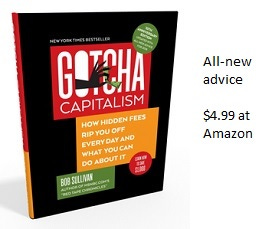Credit cards: 10 years later, the Gotchas aren't gone, but they're on the run: 30 Days of Gotchas
Wikimedia Commons
(NOTE: This is a free excerpt from my new book: Gotcha Capitalism, 10 years later. A lot has happened in the world of credit cards since 2008. It’s fun to look back….)
When I began writing Gotcha Capitalism sometime in 2006, there was only one choice for Chapter One: credit cards. Nothing inspired more consumer ire than those dastardly, seductive pieces of plastic. Americans’ wallets were stuffed full of the things. At the time, credit cards were little more than ticking personal finance time bombs. They were the plastic people loved to hate. Credit-card issuers had dreamed up a boatload of tricks and traps — their cruel names are probably seared somewhere into the back of your memory now. Double-cycle billing. Universal default. Over-limit fees. Penalty interest rate. Issuers played games with monthly due dates that could make even the most responsible payer into a “deadbeat.” I began this chapter with the sad story of a poor soul who had paid more than $6,300 on a $3,200 bill but somehow still owed more than $4,000. His story was hardly unique.

Flash forward 10 years, and things could hardly be more different. I don’t know if I’d even bother to include a separate chapter on credit cards today. It took the financial crisis and years of accumulated ill will, but Congress passed the CARD Act in 2009 (the Credit Card Accountability Responsibility and Disclosure Act), and that changed everything. It slashed the number of reasons credit cards could load fees and interest changes onto consumers. It required new warnings and disclosures. As you’d expect, the industry was dragged kicking and screaming into this new world order and threatened repeatedly that the changes would have devastating consequences for consumers. Cards would dry up, they warned, and the economy would suffer, as consumers could no longer get credit they needed. Lower-income consumers would suffer the most, they warned.
That turned out to be bunk.
Numerous studies — as well as your own two eyes — reveal that the credit card business is thriving, just now without all the cheating. An independent report on the CARD Act published in 2014 by a team of academics led by economist Johannes Stroebel of New York University — a skeptic of credit-card regulation — serves as one example. His team found that the elimination of many fees and clarity on other penalties and repayment terms were saving consumers $12.6 billion annually. It also found that the true cost of credit — interest rate plus fees — had shrunk significantly since implementation of the CARD Act, even more for consumers with poor credit.
“We find that regulatory limits on credit-card fees reduced overall borrowing costs to consumers by an annualized 1.7 percent of average daily balances, with a decline of more than 5.5 percent for consumers with the lowest FICO scores,” the paper said.
So, when it comes to credit cards, the past decade has been a big success for consumers. Banks haven’t done too badly, either. U.S. consumers broke through quite a barrier in 2017, when total credit-card debt reached $1.021 trillion, an all-time high, besting the previous record set back in April 2008.
Of course, credit cards can still get you in trouble. That’s more likely to be your own fault, however, than the result of bank shenanigans. Today, your biggest complaint about credit cards is likely to be rewards point “inflation,” which drains value out of your points balances. But critically, banks now can’t raise your rates for just any reason and can’t apply new rates retroactively to old balances — both common practices in the past. In fact, a long set of unsavory bank tactics are now outlawed.
Here’s what you need to know now about credit-card fees and interest rate hikes. If you are 60 days late with a credit-card payment, the bank can bump you up to a penalty rate of around 30 percent. Banks can also raise your rate when a promotional rate ends, after you've had a card for more than a year, or after your credit score drops. In each of these cases, the bank has to give you plenty of warning, and you have the option to stop using the card and pay it off at the old rate. Those are the new rules of the road, thanks to the CARD Act.
Still, to understand the spirit of how credit-card issuers make their money, and how you can Gotcha-proof yourself against any tactics they re-create or resurrect in the future, read on to remember what the dark days of credit cards were really like.
Read on ... buy the book!
ORDER THE NEW EDITION OF GOTCHA CAPITALISM NOW! (Print edition also available)


